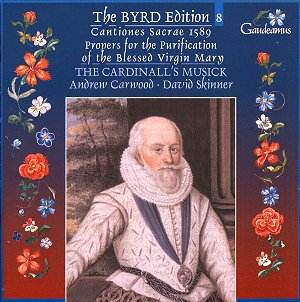

William BYRD (c.1535/40 - 1623)
Cantiones Sacrae (1589)
Vigilate - Motet: 5vv [4.32]
In resurrectione tua - Motet: 5vv [1.36]
Aspice Domine de seda - Motet: 5vv [5.42]
Ne irascaris Domine - Motet: 5vv [8.36]
O quam gloriosum - Motet: 5vv [5.00]
Tribulationes civitatum - Motet: 5vv [8.14]
Domine secundum multitudinem - Motet: 5vv [3.15]
Laetentur caeli - Motet: 5vv [3.42]
Propers for the Feast of the Purification
Senex puerum portabat -Antiphon: 4vv [1.49]
Adorna thalamum - Processional: 3vv [3.35]
Suscepimus - Introit & Gradual: 5vv [6.11]
Senex puerum - Alleluia: 5vv [1.35]
Nunc dimittis - Tract: 5vv [4.22]
Diffusa est gratia - Offertory: 5vv [1.22]
Responsum accepit - Communion: 5vv [3.00]
Hodie beata Virgo - Antiphon: 4vv [2.22]
Ave regina caelorum - Antiphon: 4vv [3.11]
![]() The Cardinallís
Musick/Andrew Carwood
The Cardinallís
Musick/Andrew Carwood
Recorded in 13-15 February 2001, 17 February 2000, 15 November 2000 and
1 March 1999 at the Fitzalan Chapel, Arundel Castle.
![]() ASV GAUDEAMUS CDGAU
309 [70.35]
ASV GAUDEAMUS CDGAU
309 [70.35]
BUY NOW